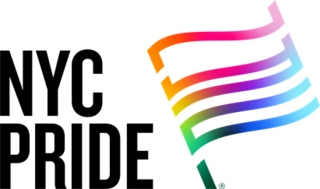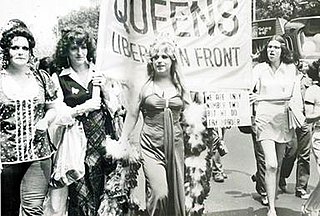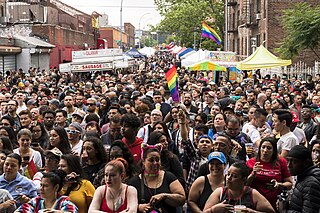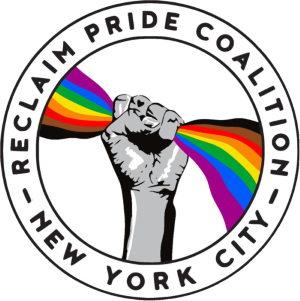Related Research Articles

A pride parade is an event celebrating lesbian, gay, bisexual, transgender and queer (LGBTQ) social and self-acceptance, achievements, legal rights, and pride. The events sometimes also serve as demonstrations for legal rights such as same-sex marriage. Most occur annually throughout the Western world, while some take place every June to commemorate the 1969 Stonewall riots in New York City, which was a pivotal moment in modern LGBTQ social movements. The parades seek to create community and honor the history of the movement. In 1970, pride and protest marches were held in Chicago, New York City, Los Angeles, and San Francisco around the first anniversary of Stonewall. The events became annual and grew internationally. In 2019, New York and the world celebrated the largest international Pride celebration in history: Stonewall 50 - WorldPride NYC 2019, commemorating the 50th anniversary of the Stonewall Riots, with five million attending in Manhattan alone. Pride parades occur in urban locations worldwide, incl. cities or urban areas in Argentina, Australia, Brazil, Canada, Chile, Denmark, Finland, France, Israel, Japan, Mexico and the United States.

A dyke march is a lesbian visibility and protest march, much like the original Gay Pride parades and gay rights demonstrations. The main purpose of a dyke march is the encouragement of activism within the lesbian and sapphic community. Dyke marches commonly take place the Friday or Saturday before LGBTQ pride parades. Larger metropolitan areas usually have several Pride-related happenings both before and after the march to further community building; with social outreach to specific segments such as older women, women of color, and lesbian parenting groups.

Heritage of Pride (HOP), doing business as NYC Pride, is a 501(c)(3) non-profit organization that plans and produces the official New York City LGBTQIA+ Pride Week events each June. HOP began working on the events in 1984, taking on the work previously done by the Christopher Street Liberation Day Committee organizers of the first NYC Pride March in 1970. HOP also took over responsibility for the operations of NYC's Pride Festival and Pride Rally. It was that first march that brought national attention to 1969's Stonewall Riots. The late sixties saw numerous protests and riots across the United States on many social injustices and from general political unrest including the war in Vietnam.

Taiwan Pride is the annual LGBTQ pride parade in Taiwan. The parade was first held in 2003. Although joined by groups from all over the country, the primary location has always been the capital city of Taipei. The parade held in October 2019 attracted more than 200,000 participants, making it the largest gay pride event in East Asia. As of 2019, it is the largest in Asia ahead of Tel Aviv Pride in Israel, which is the largest in the Middle East. Taiwan LGBT Pride Community, the organizer of Taiwan LGBTQ Pride Parade, holds the parade on the last Saturday of October.

The San Francisco Pride Band is a community-based concert, marching, and pep band in San Francisco. It is the official band of San Francisco. Founded in 1978, it was the first openly gay musical organization in the world. The band promotes visibility and musical education for the Bay Area's lesbian, gay, bisexual, transgender, queer (plus) (LGBTQ+) communities. Although a majority of its members are LGBTQ+, many are heterosexual allies who join to support the LGBTQ+ community and to participate in the community concert band, marching band, or pep band. The band presents musical programs that help build understanding between LGBTQ+ and other communities.

The NYC Pride March is an annual event celebrating the LGBTQ community in New York City. The largest pride parade and the largest pride event in the world, the NYC Pride March attracts tens of thousands of participants and millions of sidewalk spectators each June, and carries spiritual and historical significance for the worldwide LGBTQIA+ community and its advocates. Entertainer Madonna stated in 2024, "Aside from my birthday, New York Pride is the most important day of the year." The route through Lower Manhattan traverses south on Fifth Avenue, through Greenwich Village, passing the Stonewall National Monument, site of the June 1969 riots that launched the modern movement for LGBTQ+ rights.

The Audre Lorde Project is a Brooklyn, New York–based organization for LGBTQ people of color. The organization concentrates on community organizing and radical nonviolent activism around progressive issues within New York City, especially relating to LGBTQ communities, AIDS and HIV activism, pro-immigrant activism, prison reform and organizing among youth of color. It is named for the lesbian-feminist poet and activist Audre Lorde and was founded in 1994.

Pride is the promotion of the rights, self-affirmation, dignity, equality, and increased visibility of lesbian, gay, bisexual, transgender and queer (LGBTQ) people as a social group. Pride, as opposed to shame and social stigma, is the predominant outlook that bolsters most LGBTQ rights movements. Pride has lent its name to LGBTQ-themed organizations, institutes, foundations, book titles, periodicals, a cable TV channel, and the Pride Library.
This is a timeline of notable events in the history of non-heterosexual conforming people of South Asian ancestry, who may identify as LGBTIQGNC, men who have sex with men, or related culturally-specific identities such as Hijra, Aravani, Thirunangaigal, Khwajasara, Kothi, Thirunambigal, Jogappa, Jogatha, or Shiva Shakti. The recorded history traces back at least two millennia.

New York City has been described as the gay capital of the world and the central node of the LGBTQ+ sociopolitical ecosystem, and is home to one of the world's largest and most prominent LGBTQ+ populations. Brian Silverman, the author of Frommer's New York City from $90 a Day, wrote the city has "one of the world's largest, loudest, and most powerful LGBT communities", and "Gay and lesbian culture is as much a part of New York's basic identity as yellow cabs, high-rise buildings, and Broadway theatre". LGBT travel guide Queer in the World states, "The fabulosity of Gay New York is unrivaled on Earth, and queer culture seeps into every corner of its five boroughs". LGBTQ advocate and entertainer Madonna stated metaphorically, "Anyways, not only is New York City the best place in the world because of the queer people here. Let me tell you something, if you can make it here, then you must be queer."
This is a timeline of notable events in the history of non-heterosexual conforming people of Asian and Pacific Islander ancestry, who may identify as LGBTIQGNC, men who have sex with men, or related culturally-specific identities. This timeline includes events both in Asia and the Pacific Islands and in the global Asian and Pacific Islander diaspora, as the histories are very deeply linked. Please note: this is a very incomplete timeline, notably lacking LGBTQ-specific items from the 1800s to 1970s, and should not be used as a research resource until additional material is added.
The National Queer Asian Pacific Islander Alliance (NQAPIA) is an American federation of Asian American, South Asian, Southeast Asian. and Pacific Islander LGBTQ organizations. NQAPIA was formed in 2007, as an outgrowth of the LGBT APA Roundtable working groups at the 2005 National Gay Lesbian Task Force Creating Change Conference in Oakland, California. NQAPIA seeks to build the capacity of local LGBT AAPI organizations, invigorate grassroots organizing, develop leadership, and challenge homophobia, racism, and anti-immigrant bias. The organization "focuses on grass-roots organizing and leadership development."
Trans Day of Action (TDOA) began in 2005 and is an annual rally and march held in late June in New York City. It is organized by the Audre Lorde Project's Trans Justice group. It aims "to call attention to the continued violence, discrimination and institutionalization of our people [Trans and Gender Non-Conforming people], while simultaneously lifting up and celebrating our legacy of resilience, organizing, and community building." While addressing issues that disproportionately impact trans and gender non-conforming people, TDOA is also meant to honor and contribute to the broader "struggle for justice, liberation, and recognition for all oppressed people worldwide."

Queens Liberation Front (QLF) was a homophile group primarily focused on transvestite rights advocacy organization in New York City. QLF was formed in 1969 and active in the 1970s. They published Drag Queens: A Magazine About the Transvestite beginning in 1971. The Queens Liberation Front collaborated with a number of other LGBTQ+ activist groups, including the Gay Activists Alliance and the Street Transvestite Action Revolutionaries.
GAPIMNY is an all-volunteer-run organization that provides a range of social, educational, and cultural programming for queer and transgender people who are Asian and/or Pacific Islander in the New York City metropolitan area to support each other. The organization's community building efforts is intricately tied to political education and mutual aid.

Twin Cities Pride, sometimes Twin Cities LGBT Pride, is an American nonprofit organization in Minnesota that hosts an annual celebration each June that focuses on the LGBT community. The celebration features a pride parade which draws crowds of nearly 600,000 people. The parade was designated the Ashley Rukes GLBT Pride Parade in honor of the late former parade organizer and transgender LGBT rights activist. Other Twin Cities Pride events include a festival in Loring Park and a block party spanning multiple days.

The Queens Pride Parade and Multicultural Festival is the second oldest and second-largest pride parade in New York City. It is held annually in the neighborhood of Jackson Heights, located in the New York City borough of Queens. The parade was founded by Daniel Dromm and Maritza Martinez to raise the visibility of the LGBTQ community in Queens and memorialize Jackson Heights resident Julio Rivera. Queens also serves as the largest transgender hub in the Western hemisphere and is the most ethnically diverse urban area in the world.

Reclaim Pride Coalition is a coalition of LGBT groups and individuals that initially gathered in New York City in 2019 to create the Queer Liberation March in honor of the 50th Anniversary of the Stonewall riots and to protest the commercialization of LGBT Pride events. The following year, in solidarity with Black Lives Matter, the coalition organized the Queer Liberation March for Black Lives & Against Police Brutality.
Queer radicalism can be defined as actions taken by queer groups which contribute to a change in laws and/or social norms. The key difference between queer radicalism and queer activism is that radicalism is often disruptive and commonly involves illegal action. Due to the nature of LGBTQ+ laws around the world, almost all queer activism that took place before the decriminalization of gay marriage can be considered radical action. The history of queer radicalism can be expressed through the many organizations and protests that contributed to a common cause of improving the rights and social acceptance of the LGBTQ+ community.
References
- ↑ Smith-Cruz, Shawn(ta) (2024-05-29). "The radical joy of queer Asian community: A photo love letter". Reckon. Retrieved 2024-08-14.
- 1 2 3 4 "Day 161: South Asian Lesbian and Gay Association Protests, Manhattan, New York". APIAHiP. Retrieved 2024-08-14.
- ↑ Staff, A. P. A. (2015-01-28). "SALGA-NYC, Serving the Queer Desi Community Records". Asian/Pacific American Archives Survey Project. Retrieved 2020-11-29.
- ↑ Rozner, Lisa (2023-06-13). "SALGA volunteers help South Asian LGBTQIA+ community find support and strength in New York City - CBS New York". www.cbsnews.com. Retrieved 2024-08-14.
- 1 2 Lee, Denny (2000-07-30). "NEIGHBORHOOD REPORT: FLATIRON; New Tolerance at an Old Tradition". The New York Times. ISSN 0362-4331 . Retrieved 2024-08-14.
- ↑ Venugopal, Arun (2010-08-16). "South Asian LGBT Community Marches in India Day Parade". WNYC. Retrieved 2020-11-29.